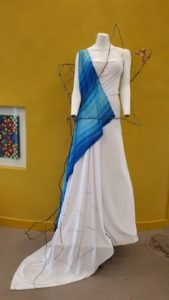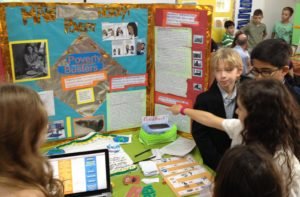After six years in the international education system, with one teenager about to finish his IB and another who chose a different path, I feel ready to dive into the depth of this special program and try to explain the way I perceive its charm.
Origins of the IB
IB was initiated by a group of teachers from the International School in Geneva. The goal was to create a curriculum that encourages international awareness along with the skills, attitudes and knowledge required for participation in a global society. The program strives to produce curious, knowledgeable and motivated students. Those who will build a better world through intercultural respect and understanding. To promote these goals, a holistic program was developed. A program that will focus not only on academic aspects, but also on the development of general problem solving skills, independence, and awareness of the local and global context. The aim of the IB is to move its students away from the classroom. And at the same time encourage them to collaborate and get involved in school life and in their surrounding community.
The primary years
The IB journey starts at the age of 3. From this point on to fifth grade, students will be part of the “Primary Years Program” (PYP). Based on the principles of Inquiry Based learning, the program encourages independent thinking and personal responsibility. This is achieved by investigating local and global issues through an interdisciplinary prism. Teachers in the PYP, are perceived as collaborators who help the student deepen their learning and increase their confidence and motivation. The entire school population, including the parents, become partners in the student’s learning process. Together, they contribute to a holistic educational experience. The program culminates in an impressive exhibition in which serious formally dressed fifth graders present their group research projects. Parents are often surprised by the depth of knowledge expressed in the beautiful presentations focusing on environment, society, and global politics.

The Middle Years
In middle school, IB students go through the Middle Years Program (MYP). Here, learning continues to be based on the principles of independent inquiry. Study subjects expand to include two-languages, humanities, science, mathematics, art, physical education, and technology. The aim of the Middle Years program is to support the student in developing self-awareness, personal identity, and responsibility for the surrounding community. Throughout this program students develop learning strategies that will help them in their studies. The prevailing philosophy is that learning how to learn is much more important than the learning of specifics contents. The goal here is not to accumulate knowledge but to develop skills. Mainly, the development of ways of thinking which can be applied to diverse situations and new information. The middle years program ends with a personal project. In this project, each student chooses a subject he is interested in. He then identifies what he already knows about the subject, what he still needs to learn, and then creates a framework for completing the project with criteria for its evaluation.
The Diploma
And then comes the diploma… the goal of the IB program and what is usually referred to by the term International Baccalaureate. The IB Diploma Program calls for all those research and independent project based learning skills students developed along their IB years. The goal of the diploma program is to develop broad minded, knowledgeable graduates, with developed physical, intellectual, ethical and emotional skills. Graduating the program requires the study of at least two different languages, excellence in traditional academic fields, and an investigation of knowledge itself through a special course developed for the IB.
To complete the diploma, each student is required to choose from six subject areas, including studies in language and literature, language acquisition, and studies in individuals and societies, sciences, mathematics, and the arts (or another subject from the first five). Based on the student’s choice, three of the subjects are studied at a standard level and three at a higher level. Final scores in the six subjects are based on an external evaluation (an exam by the IB organization) and an internal assessment by the school. Internal assessments change from subject to subject and include an oral examination in the languages, a lab report in the sciences, a research project in math, and an art project in the arts.

In addition to the above, students are required to complete the diploma’s core, which includes three extensive tasks aimed at expanding and applying their knowledge. The first task is the Extended Essay (EE), a 4000-word essay about a research topic related to one of the six subject areas. As with the personal project at the end of the MYP, students choose a subject that is close to their heart (be it as esoteric as they wish), they then conduct a thorough study of the subject, and write a university-level paper about it. The second task on the way to completing the core is a course in Theory of Knowledge (TOK). A broad course developed for the IB program which encourages thinking about the essence of knowledge through examination of its components. The course develops critical thinking, reflection, and ability to evaluate cultures from different perspectives. As part of TOK, students create a presentation and write an extensive essay on a philosophical topic related knowledge and its possible biases. The goal of the third core task is development of the student’s spirit through Creativity, Action and Service (CAS). Here, the students perform tasks of their own choosing, which demonstrate progress in each of the CAS three areas.
The diploma concludes with examinations in each of the six subjects which together with the internal assessment grant them grades from 1 to 7. For successful completion of the diploma core students can receive up to 3 additional points, bringing their diplomas cumulative grade to the desired maximum of 45 points.
And how it all looks in real life?
Our experience of the IB started as our kids first entered international school in grades 5 and 7. With my background in education I was fascinated by the program’s presentations which seemed to pour content into all those theoretical concepts we learned in teaching seminar. Inquiry based learning, teachers as partners, creativity, all joined by the charm of the resourceful international school promised an educational paradise.
 Our first year in IB land has ended with the PYP exhibition. In smart skirt and white blouse was my daughter, who just few months before murmured her first words in English, impressing us with a fluent speech about her global warming project. Every morning along this year was a new learning adventure, each teacher was an inspiration, and at the end of the year IB won my full confidence.
Our first year in IB land has ended with the PYP exhibition. In smart skirt and white blouse was my daughter, who just few months before murmured her first words in English, impressing us with a fluent speech about her global warming project. Every morning along this year was a new learning adventure, each teacher was an inspiration, and at the end of the year IB won my full confidence.
Moving to middle school, my kids transferred to a school which combined the IB curriculum with IGCSE exams (a different program based on the English curriculum). In theory, the school was implementing the MYP, but for the sake of the demanding IGCSE exams, personal projects were abandoned and the studies (though still in the resourceful beautiful international school environment) focused much less on strategies and more on content and achievements. It was only in the last couple of years that we discovered the true qualities of the MYP program through my daughter’s program at the international school in Hong Kong. Buildings towards personal projects, the program became deep and meaningful, embedding in the students vital learning strategies which will help them in their future studies and careers. The project itself called for an impressive exploration into my daughter’s personal and national identity, resulting in far-reaching conclusions which influenced all of us.
And at the same time, our eldest began the last bit of his high school journey with the IB Diploma. The first year was characterized by a great deal of interest, resulting both from the focus on selected subjects and from the Theory of Knowledge course, which brought up a great selection of discussion topics to our dinner table. And yet, moving on and especially towards the second and last years of high school, workload substantially increased. And with it, stress creeped in, reaching alarming levels as due dates of all six internal assessments, expanded essay, and TOK presentation and paper were hitting together.
And the bottom line?
I have no doubt that the IB program contributes greatly to both the character and academic abilities of its students. The product of the international education system is a broad-minded young adult with global insights and an impressive international perception. Obviously, a significant part of this has to do with the actual setting of the international schools, where a typical student is surrounded with peers from over 70 different nationalities. And yet the emphasis in the curriculum on global issues seems to contribute significantly.
We hear constantly of IB’s advantages for the future of our children. Universities, especially in the US, embrace graduates of the program. Acknowledging the high demands, they welcome graduates who survived the diploma. IB graduates themselves seem to easily sail through the first years of college as the strategies and abilities they developed in high school (they claim) exceed the requirements of any standard university assignment (“over kill” were the words used by a friend’s daughter when comparing IB essays requirements to those she had only one year later). IB success means not only admission to US universities (with 18% higher chances) but also scholarships and even course credits (i.e., 30-45 credit points in US State universities). It should be noted though that the picture may be somewhat different in the context of universities in England, which still rely on AP graduates.
 But beyond the rates of college admissions, it seems that the IB program prepares its students to the world of tomorrow. And in what seems to be a better way compared to many other programs. In the face of horror scenarios about lost professions and robots which will soon replace every trade that does not include creative thinking and complex reasoning, a curriculum that requires students to think is prominent. Leaving behind the repetition which characterized our school days, IB requires real investigation. The study of every subject is done from a series of different perspectives, and every written submission requires critical thinking, originality, careful source examination, and reflection on the entire process. This complex way of thinking soon becomes second nature over the students’ daily discussions and in their critical observation of the world around them. Being aware of the impossible amount of currently available information, its relative subjectivity, and the way it changes from continent to continent (the different angles of WWII as an example) IB is not advocating for accumulation of content, and supports the learning of ideas instead of specific events. In this way, my tenth-grader learned about immigration as a concept, with each student investigating his chosen population and period. The subject culminated with personal account of a refugee simulation, bringing the idea one step closer. This form of learning seems to be much more suited to a world of readily available information, where the important skill is knowing how to pick through the piles and select only relevant and reliable bits of information.
But beyond the rates of college admissions, it seems that the IB program prepares its students to the world of tomorrow. And in what seems to be a better way compared to many other programs. In the face of horror scenarios about lost professions and robots which will soon replace every trade that does not include creative thinking and complex reasoning, a curriculum that requires students to think is prominent. Leaving behind the repetition which characterized our school days, IB requires real investigation. The study of every subject is done from a series of different perspectives, and every written submission requires critical thinking, originality, careful source examination, and reflection on the entire process. This complex way of thinking soon becomes second nature over the students’ daily discussions and in their critical observation of the world around them. Being aware of the impossible amount of currently available information, its relative subjectivity, and the way it changes from continent to continent (the different angles of WWII as an example) IB is not advocating for accumulation of content, and supports the learning of ideas instead of specific events. In this way, my tenth-grader learned about immigration as a concept, with each student investigating his chosen population and period. The subject culminated with personal account of a refugee simulation, bringing the idea one step closer. This form of learning seems to be much more suited to a world of readily available information, where the important skill is knowing how to pick through the piles and select only relevant and reliable bits of information.
And yet the road to IB is definitely not paved in gold. Stress is known to be a major part of the diploma years, ambiguity is in many times perceived in regard to study goals, and frustration is sometimes perceived in the face of complex criteria and grading scales. Adding to that it must be reminded that at the end of the day, even the most wonderful program and excellent school depend on the teacher in the classroom to bring all those beautiful ideas into action. And just as my old math teacher, back in the frontal rudimentary teaching days, managed to bring life to this difficult subject, a science teacher of my daughter, within the glorious IB program, managed to ruin the entire subject for her.
But I’m a believer…
And despite all my reservations and doubts, despite the stress and the difficulties we experienced, I still believe in the way and in the method. At the end of these six years of International Schooling, after comparing the different methods, I feel confident enough to summarize and say that IB is the closest to the teaching ideal we imagined back in seminar. And even if my kids’ paths will not end within the system, I still have no doubt that the impact of their IB education will support them throughout their academic and personal trails, whether through the learning strategies they gained, the environmental awareness and responsibility they developed, or the intellectual curiosity that characterizes them today. So even if the product is not perfect and the path is not always clear, and even if it’s only for a few years, my feeling is that the IB curriculum is sure to have a significant and long-term positive effect on every student who takes part in it.
More information about the IB program
By Dr Taly Goren, a long time traveler between nations and continents,
relocation specialist, mother of two TCKs,
and the wife of a Nomad frequent flyer.


